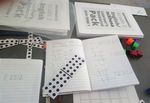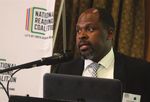Collaboration to boost reading revolution during South African Library Week - Department of Basic Education
←
→
Page content transcription
If your browser does not render page correctly, please read the page content below
Collaboration to boost reading revolution during
South African Library Week
The DBE is celebrating South African Library Week (SALW) along with libraries across
SOUTH AFRICAN LIBRARY WEEK the country from 18 to 24 March 2019 to promote a reading culture in South Africa. Led
by the Library and Information Association of South Africa (LIASA), the theme for this
year’s celebrations is “Collaborate @ your library”. South Africans are encouraged to
use this week to read books written in indigenous languages and by African writers.
This will contribute towards ensuring that the country’s diversity and unique heritage
unite South Africans.
COLLABORATE The SALW 2019 theme corresponds with the LIASA Presidential theme: “Libraries:
Advancing development through collaboration, partnerships and innovation” to enhance
mutual benefits from forging relationships. The Presidential theme, which focuses on
the advancement of development through engagement with all interested parties,
YOUR LIBRARY
emphasises the significant role that libraries can play to implement the global, regional
and national sustainable development agendas that call for public access to information,
access to technology and lifelong learning.
In response to President Cyril Ramaphosa’s call to inculcate a culture of reading in
2019 the country, the DBE, in collaboration with the National Education Collaboration Trust
(NECT), launched the National Reading Coalition (NRC) on 15 February 2019. The NRC
brings together leaders in education, community, government and the private sector to
improve children’s literacy, and aims to mobilise and coordinate reading initiatives. The
coalition will build on many other initiatives such as the outreach programme known
as the Funda Mzantsi Project, which was established to improve the reading habits of
South Africans, by instilling a love of reading.
During SALW the DBE calls upon South Africans to support a culture of reading through the establishment of book clubs and by visiting
local libraries to “get the nation to read” and to ignite the reading revolution.Public Comment invited on Proposed 2021 School
Calendar for Public Schools
Basic Education Minister, Mrs Angie Motshekga, acting under section 3(4)(k) of the National Education Policy Act, 1996 (No. 27 of 1996),
and after consultation with the Council of Education Ministers (CEM), invites stakeholder bodies and members of the public to comment
on the Proposed 2021 School Calendar.
All interested persons and organisations are invited to comment on the Proposed 2021 School Calendar in writing. Comments must be
directed to the Director-General, Department of Basic Education, for the attention of Mr Sihle Mlambo at email: Mlambo.s@dbe.gov.za,
and cc Manaka.l@dbe.gov.za.
All comments must reach the DBE no later than 19 April 2019.
The Proposed 2021 School Calendar for Public Schools can be accessed on the Departmental website:
Click on the below link for additional information:
h t t p s : / / w w w. e d u c a t i o n . g o v. z a / P o r t a l s / 0 / D o c u m e n t s / L e g i s l a t i o n / C a l l % 2 0 f o r % 2 0 C o m m e n t s / 2 0 2 1 % 2 0 C a l e n d a r.
pdf?ver=2019-03-19-134223-793
Mathematics Teaching and Learning Framework for South
Africa teaches Mathematics for Understanding
The Mathematics Teaching and Learning Framework for South Africa: Teaching Mathematics for Understanding (TMU), which will be
officially implemented during 2019, introduces a balanced and multi-dimensional approach for the teaching of Mathematics in South
African schools. The Framework will be implemented in the context of a learning-centred classroom where learners and teachers engage
actively, discussing and experimenting with mathematical ideas.
The Mathematics Indaba that took place from 12 to 14 December 2016; under the theme: “Meaningful and effective Mathematics teaching
and learning: In search of the South African pedagogical identity”, recommended the appointment of a Ministerial Mathematics Task Team
(MMTT) to develop the National Framework on the teaching and learning of Mathematics.
The TMU approach is currently being field-tested in the Foundation Phase in 41 schools in the Eastern Cape, KwaZulu-Natal and
Limpopo Provinces as a collaboration between the DBE, the NECT, researchers and two conceptual advisors from the Japan International
Cooperation Agency (JICA). The two JICA Mathematics experts have been instrumental in the development of the Framework, acting as
conceptual advisors in developing the Unit Plan of the Curriculum Assessment Policy Statement (CAPS) for Grades 1 to 3 Mathematics.
The Framework introduces new approaches that are learner and teacher friendly whilst promoting number sense and play-based learning
in classrooms. Feedback received from teachers will be used to strengthen materials and trainings for the subsequent terms. Term 2
training is scheduled for the end of March 2019.Lesson Study Programme to improve learning and
teaching in the classroom
Teachers responsible for Natural Science and Technology for learners in Grades 4 to 6 and Natural Science for learners in Grades
7 to 9, require a new approach to improve quality learning and teaching in public schools. The DBE has rolled out the Lesson Study
Programme for Provincial Education Departments (PEDs) to guide teachers on the application of various classroom teaching techniques.
Training has already commenced in the North West and Eastern Cape Provinces with training set to continue across provinces as part
of showcasing best practice. As part of the Programme, the DBE has organised a crew of videographers to capture all lessons rendered
by experienced subject advisors. The scripted lessons will serve as training material for teachers to enrich their content knowledge and
teaching competences in these subjects.
According to Mr Maki Zihlangu, Subject Advisor for Natural Science for Grade 7 to 9 and Natural Science and Technology for Grade 4
to 6, the Lesson Study Programme will afford DBE an opportunity to zoom into learning barriers in the early grades to initiate focused
intervention support programmes. “Learners understand better when they are exposed to practical activities, especially in Natural Science
and Technology,” Mr Zihlangu said, and added that it is important that teachers work together as a team to improve the standard of lesson
planning to ensure effective curriculum coverage.
Ms Pumla Mphahlwa, Subject Advisor for Natural Science in the Intermediate and Senior Phase, said one significant element that should
be considered in the creation of active participation of learners in class, is the allocation of tasks that compel them to work in groups. She
also added that it is critical for teachers to promote reading across the curriculum to familiarise learners with key words that are required
to comprehend various concepts covered per subject. This will also make it easier for them to understand and share findings emanating
from practical exercises.Provincial Round-up Mpumalanga Province The Mpumalanga Department of Education, in collaboration with Conservation South Africa and Top T, an operational subsidiary of Ceramic Tile Manufacturer, handed over a multi-purpose sport facility to Acorn-Oaks Comprehensive High School in Bushbuckridge Local Municipality earlier this week. The R 8 million sports facility will not only promote school sport and physical activity, but also increase the self-esteem and mental alertness of learners. School sports teaches children life skills such as teamwork, leadership and patience. The Department explained that the multi-purpose sport facility was handed-over as a response to the recent Africa Play Conference where Basic Education Minister, Mrs Angie Motshekga said: “Our objective as a collective at this inaugural Africa Play Conference must be to engage as many professionals and stakeholders on the evolving view that play is actually the backbone of learning for young active minds”. KwaZulu-Natal Province A Workshop on Curriculum Differentiation will be taking place in Durban in the KwaZulu-Natal Province from 25 to 28 March 2019. The participants include a training team from the KwaZulu- Natal Department of Education (KZNDoE), 33 District training teams and 20 Subject Advisors for English Language and Mathematics. The VVOB (Flemish Association for Development Cooperation and Technical Assistance) programme in South Africa focuses on strengthening the quality of primary education, with a focus on in- service teacher training as school leaders and teachers in primary schools have the competences to respond to learner diversity by applying inclusive pedagogy for numeracy and literacy. With this workshop, the KZNDoE and VVOB aim to respond to the need of the district training teams in Ilembe, Umzinyathi and Zululand, as well as subject advisors to strengthen their understanding of curriculum differentiation. Participants are exposed to curriculum differentiation in primary education, including differentiating teaching strategies, environment, assessment and content, in different contexts and in the subjects of Mathematics and English language. The teams consists of district officials from Special Needs Educational Services, Curriculum, Circuit Management, Teacher Development and school-based educators. Western Cape Province The Western Cape Education Department (WCED) will be hosting a Future Focused Education Conversations Conference at the Cape Town International Convention Centre from 25 to 26 March 2019. The Conference aims at addressing educational challenges with a focus on rapidly changing technological and scientific skills required for the Fourth Industrial Revolution, under the overall theme of the Conference: “Quality Future-focussed Education”.
Upcoming Events
• 19 – 29 March 2019: Director-General for Basic Education, Mr Hubert Mathanzima Mweli, will be conducting his Autumn Schools
Monitoring Visits across the various provinces
• 05 April 2019: The Ministerial Task Team examining existing textbooks and Learning and Teaching Support Material (LTSM) will
launch their evaluation report at the DBE Building in Pretoria, Gauteng Province
• 08 April 2019: Deadline for the submission of the SADC Secondary School Essay Competition entries to the various Provincial
Education Departments (PEDs)
• 24 April 2019: President Cyril Ramaphosa will be launching the Presidential Reading Club Initiative in the Gauteng Province
• 27 April 2019: South Africa will be celebrating Freedom Day
• 31 May 2019: Deadline for the submission of the SADC Secondary School Essay Competition entries to the SADC Secretariat
Enquiries:
Editor: Mr Elijah Mhlanga
Chief Director: Media Liaison - National and Provincial Communication
Tel. No: 012 357 3773You can also read



























































